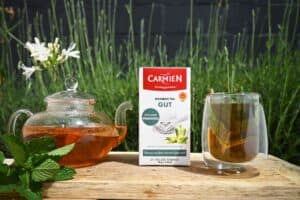Rooibos Health Benefits
Why is Rooibos Healthy
Rooibos (Aspalathus linearis) is a South African shrub gaining global recognition for its versatile health-promoting properties. The naturally sweet and aromatic flavour of rooibos complements a wide range of functional and botanical blends, including honeybush, hibiscus, and buchu. Its benefits, validated by a growing body of clinical and laboratory research, make it a valuable ingredient across the beverage, food, cosmetic, and nutraceutical industries.
Health Benefits


Naturally Caffeine-Free
Rooibos is inherently caffeine-free, making it suitable for all consumer demographics including children, pregnant individuals, and those seeking to reduce stimulant intake. This differentiates it from Camellia sinensis teas, which naturally contain caffeine. The absence of caffeine also makes rooibos ideal for evening use or formulations designed to support relaxation (Bond and Derbyshire, 2020; Afrifa et al., 2023; Carmién Tea, 2024).


Rich in Antioxidants
Rooibos is rich in polyphenolic compounds such as aspalathin and nothofagin, which exhibit strong antioxidant activities. These antioxidants help neutralise reactive oxygen species (ROS), thereby supporting cellular health and reducing inflammation. Research shows that both fermented and unfermented rooibos enhance plasma antioxidant levels in humans (Nyu, 2024; Marnewick et al., 2005; Bond and Derbyshire, 2020). Rooibos has also demonstrated chemoprotective potential comparable to green tea in certain assays (Villaño et al., 2010).


Good for Your Heart
Clinical evidence from human trials indicates rooibos can improve lipid profiles, significantly lowering LDL cholesterol and increasing HDL cholesterol levels. These effects were observed in adults consuming six cups of fermented rooibos daily for six weeks, alongside reduced markers of lipid peroxidation and improved redox status (Marnewick et al., 2011; Bond and Derbyshire, 2020). These findings suggest rooibos can play a role in cardiovascular health formulations.


Supports Blood Sugar Regulation
Rooibos, particularly in its unfermented form, has shown promising results in supporting glycaemic control. Aspalathin, the most studied compound in rooibos, enhances glucose uptake in muscle cells and stimulates insulin secretion in pancreatic beta-cells (Ulicná et al., 2006; Kobayashi et al., 2019). Both human and animal studies suggest rooibos may help manage blood glucose levels, especially in prediabetic or insulin-resistant individuals (Bond and Derbyshire, 2020; Afrifa et al., 2023).


Skin-Friendly Properties
Rooibos has a long-standing use in traditional medicine for skin conditions such as eczema, acne, and sunburn. Its anti-inflammatory and antioxidant compounds contribute to soothing skin irritation and promoting skin health. Early studies support its topical application, and its mild nature and lack of caffeine make it a safe ingredient for sensitive-skin skincare and nutricosmetic products (Marnewick et al., 2005; Carmién Tea, 2024).


Digestive Aid
Historically used to ease digestive ailments, rooibos is considered effective for reducing symptoms such as nausea, stomach cramps, and infant colic. Its low tannin content distinguishes it from other teas that can irritate the digestive tract or inhibit iron absorption. Rooibos also demonstrates mild antispasmodic properties, which may help relieve gastrointestinal discomfort (Health Benefits of Rooibos Tea, n.d.; Afrifa et al., 2023).


Allergy Relief Potential
Rooibos has shown anti-allergic properties in laboratory and limited human studies. It can inhibit mast cell degranulation and reduce basophil activation, processes involved in allergic reactions. Fermented rooibos appears particularly effective in reducing allergic markers, suggesting potential use in natural antihistamine products or allergy relief teas (Kawai et al., 2009; Bond and Derbyshire, 2020).


Bone Health Support
Emerging research suggests rooibos polyphenols may help protect bone density by mitigating oxidative stress, a factor in bone resorption. Laboratory studies demonstrate improved bone metabolism markers following rooibos administration. While human research is limited, the evidence supports the inclusion of rooibos in bone health-supportive dietary supplements (Nyu, 2024; Damiani et al., 2019).











